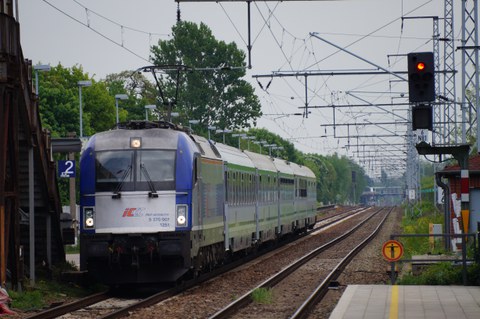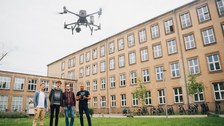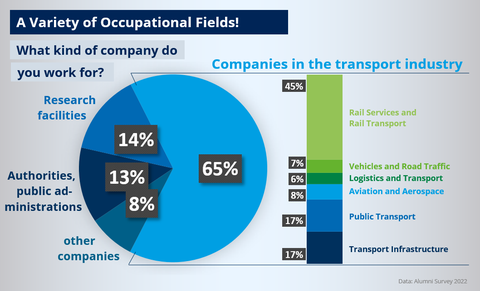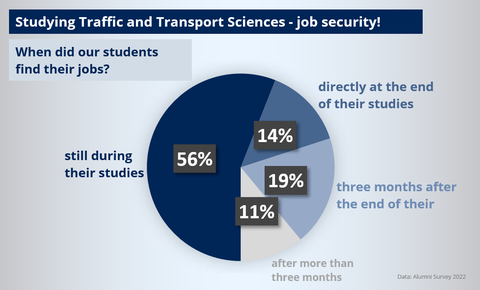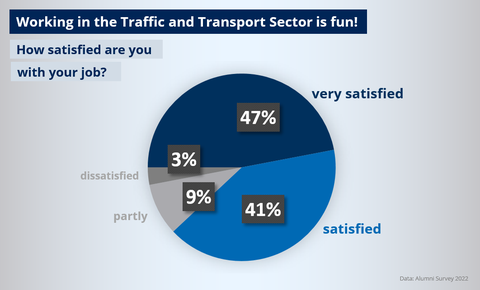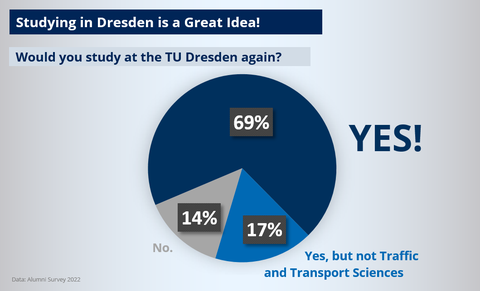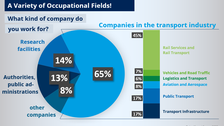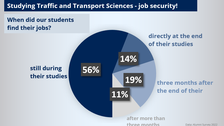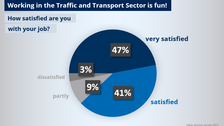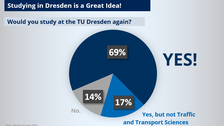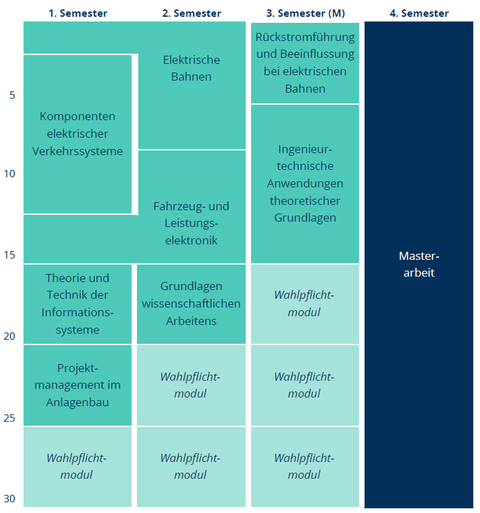Electrical Transportation Systems (Master)
Are you interested in modern mobility, transportation and everything that runs on electricity? Do you have a Bachelor's degree in automotive engineering, electrical engineering, mechatronics or a comparable subject area? Then we would like to welcome you to the Master's degree program in Electrical Transportation Systems!
The aim of the course is to qualify you for a research-related or managerial technical or technical-economic professional activity in the field of Electrical Transportation Systems.
After graduation, you will have cross-modal knowledge of the structure, functioning and application areas of Electrical Transportation Systems. The energy supply and vehicle subsystems with the main components used will be examined as well as the special features and challenges of mobile applications.
Contribute to ensuring sustainable mobility concepts and logistics chains in the context of the transport transition!

© Benjamin Jenak, TUD

© Benjamin Jenak, TUD
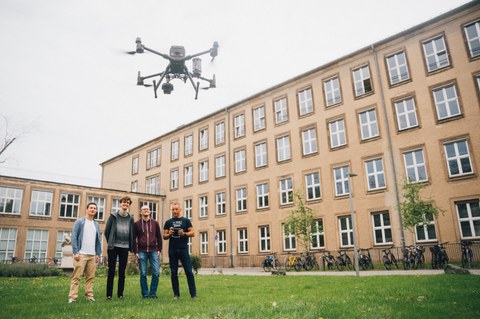
© Benjamin Jenak, TUD
| Degree | Master of Science (M. Sc.) |
| Standard period of study | 4 semesters |
| Primary teaching language | German |
| Part-time study | possible (50 %) |
| Numerus clausus | no NC |
| Start of studies | Winter semester (October 1) |
| Application deadline | June 1 - September 15* *April 1 - July 15 for international applicants |
Studying Traffic and Transportation Science means job security! 70 percent of our students have their first permanent job while still studying or directly at the end of their studies. Almost all of our graduates enter attractive career paths after three months of job search at the latest. Career planning and orientation is a top priority for us even during our studies - with an annual in-house carreer fair, job portal, alumni association, and much more.
Possible occupational fields:
— Infrastructure technology, energy technology, energy supply technology
— Railway and automotive industry
— Renewable energy systems
— Public transport companies, railway companies
— Traffic departments of city, municipal, state and federal authorities
— Public authorities, institutions with tasks in planning and operating electrical transport systems on rails and roads
— Regulatory agencies
— Companies for planning, carrying out projects and consulting
— Project management
— Higher education institutions/universities in teaching and research
— Research institutes
By completing the compulsory modules Fundamentals of Electrical Transportation Systems, Electric Railways, Particular Problems and Interfaces, you will be familiar with the structure and function of electrical transportation systems as well as with the theoretical fundamentals of the energy supply and vehicle subsystems and their main components. You will have knowledge of the methodical procedure for the selection and scalability of equipment while considering the necessary constraints as well as the basics of diagnostics. The lectures are supplemented by in-depth and application-oriented exercise courses, internships and self-study. In addition, an in-depth, multi-unit practical laboratory course on the topics of vehicles and infrastructure to deepen the theoretical basic knowledge is offered. The practical laboratory course is concluded with a term paper. Further focal points are energy management and operating strategies in mobile and stationary systems as well as the diagnosis of mechatronic vehicle systems. There, the electrification of the powertrain in motor vehicles, the basics of energy management as well as the characterisation of electrical storage systems in stationary and mobile application are closely studied. You will be able to examine the effects of new technologies, such as energy storage devices or charging systems, regarding their technical, ecological and social relevance and usefulness. After completing the modules, you will be able to assess the impact of electrical transportation systems on people and the environment. You will also be aware of how technical and operational solutions enable efficient, resource-saving and thus environmentally friendly transport with electric transportation systems.
In the modules electronics, information systems, project management and the practical project, the main focus is on technical subsystems of electric vehicles. You will gain knowledge about communication systems, power converter circuits and power electronic components in infrastructure and vehicles as well as expertise on the implementation of methods for the application-related selection of appropriate systems considering the technical constraints. Knowledge on the functionality of information systems with stationary, mobile and wireless data transmission as well as control systems forms the basis or essential addition to the course.
The second important pillar of this range of topics is the importance of qualified project management and its methods and procedures in vehicle and plant construction. After having completed the modules, you will be familiar with the applicable standards, procedures and methods in project management for transportation systems. For this purpose, you will prepare a term paper on a transportation-specific topic using the aforementioned knowledge and will present the results of the project in a presentation. Particular attention will be paid to the persons involved in the project with regard to teamwork, qualification requirements and project communication.
The compulsory elective modules for acquiring in-depth knowledge and qualifications may be chosen according to one's own preference and they primarily focus on topics relating to special applications of electrical transportation systems (local electrical public transportation systems) as well as specialised lectures on individual subsystems of vehicles and infrastructure (overhead contact lines, traction motors, converters and control systems, traffic sensors). In particular, the constraints for the design and implementation of the subsystems and the corresponding planning and evaluation methods are explained (traction mechanics). As an interface between design and the subsequent operation of electrical traffic infrastructure, simulation systems are presented, taking into account their procedures and methods (simulation systems, technology and procedures of digital, adaptive and intelligent systems). By applying to the examination committee, modules can also be selected from other courses of study.
The modules are supplemented with exercises, excursions and internships, with the aim of expanding the professional competencies provided in the lectures and by making this knowledge practically relevant. All modules share one common characteristic: they do not only focus on the specifics of the respective areas, but also discuss research and development approaches.
»In engineering offices, you work on a variety of transportation projects, so the tasks are diversified and stay interesting.«
»My work at the courthouse allows me to improve the local transportation systems and do good for my local community.«
»What I find exciting about my work is that we are able to design and shape the transportation systems of the next decade. In addition, we work on improving rail stations and their accessibility.«
»While working at the transportation company, I have a good overview and am able to influence the entire system. There are often many ways to solve a problem quickly and efficiently.«
»In my research, I have benefitted a lot from the professional training of the degree program. TU Dresden’s range of courses and degrees are internationally renowned in the field of transportation and traffic science.«
- In order to be accepted into the programme, you must have obtained a recognised degree or a qualification that is recognised in Germany in the fields of electrical engineering, mechatronics, automotive engineering, or a university degree in a programme with a similar area of specialisation, from a or state/state-approved university of cooperative education. The Examination Board decides if degrees are recognised as equally valid.
If proof of the first degree qualifying the applicant for a profession is not yet available, the application will be considered under the precondition that 80% of the credit points attainable for the degree have already been achieved based on completed module examinations or the final thesis and the colloquium (if applicable). A certification from the awarding institute of higher education (examination office) serves as proof of the above-mentioned academic achievements. You can find the appropriate form on the Admissions Office website. - The required English language skills can be proved by a relevant examination certificate or language certificate. These include: a general or subject-specific A-Level certificate that serves as evidence of having learned English as a foreign language from grades 5-12, A-Level certificate with proof that the exams were taken completely in English or a certificate of higher education for a degree program completed entirely in English or an English language certificate, such as TOEFL (72) or IELTS (5,5), UNIcert II.
International applicants and German applicants with a foreign university entrance qualification are kindly advised to read the requirements for German-language courses.
All regulations concerning the study program are defined in the study documents, which have been officially announced:
Studienordnung (Amtliche Bekanntmachung vom 20.06.2023)
Prüfungsordnung (Amtliche Bekanntmachung vom 20.06.2023)
The curriculum and modules may be adjusted to meet current needs. These adjustments include the following not legally binding documents:
Module description
Study schedule
The degree program can completely or temporarily be studied on a part-time basis (50%). This may apply if you are caring for children or other dependents while studying, or if you yourself are affected by health issues.
While studying part-time, the standard period of study for full-time students and the examination periods are doubled. If necessary, you can switch between part-time and full-time studies between semesters. More information on part-time studies
A separate study schedule is recommended and issued for part-time studies. Adjustments must be made when switching between full-time and part-time studies:
Part-time study schedule
The video gives you the most important information about the online application. © TU Dresden
Did we convince you to study traffic and transportation? The follow this link to get important information for you application and to find the correct application portal for traffic and transport studies.
Application period:
June 1st - September 15th
April 1st - July 15th for international applications
Master's program Electrical Transportation Systems in the TU Dresden study information system.
Multimedia insights into studying
Masterstudium Elektrische Verkehrssysteme © Social Profit GmbH, TU Dresden
Studying Electromobility - Members of the Chair of Electric Railways provide insights into the Master's degree program in Electrical Transportation Systems.
In the "Sitzgelegenheit" format, students from our faculty are asked interesting and sometimes piquant questions from the TUD community. Why is Deutsche Bahn always late? What is your favorite means of transport and what do you think transport will look like in the future?
Contact us
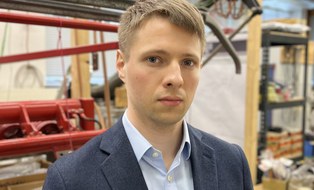 © EB
© EB
Studies Coordinator EVS
NameJan Pape
Send encrypted email via the SecureMail portal (for TUD external users only).

